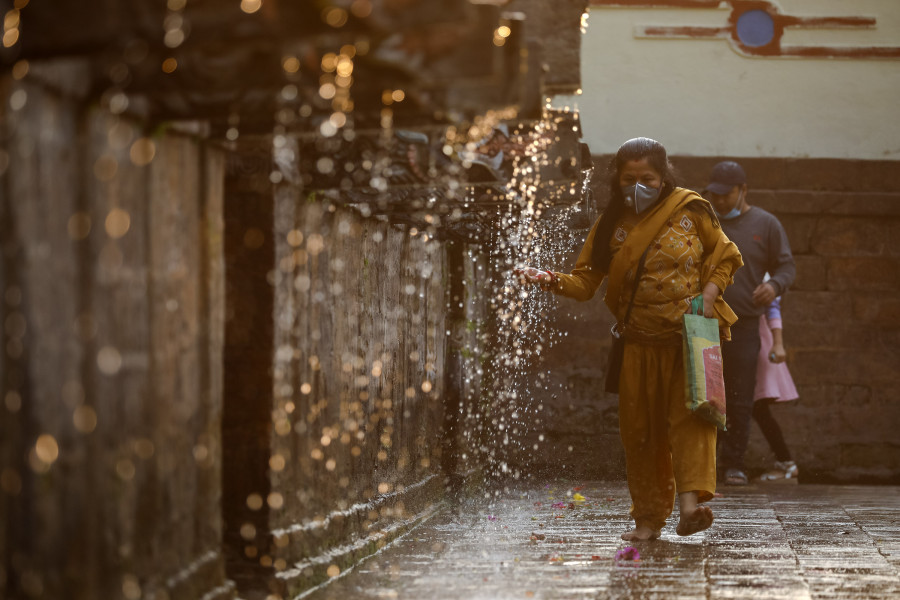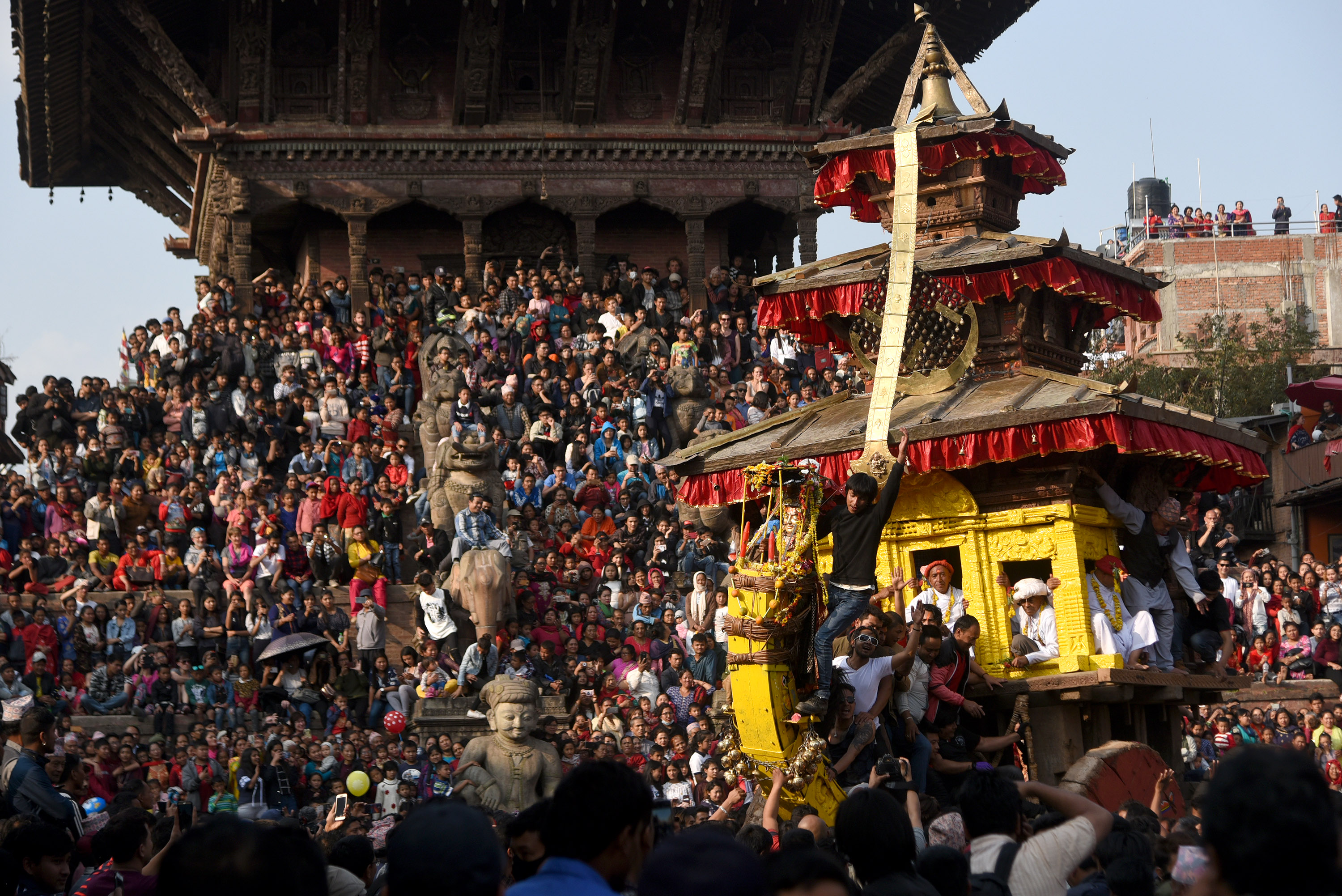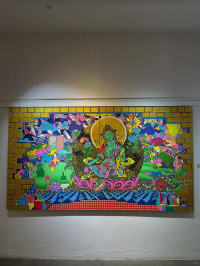Culture & Lifestyle
With a lockdown in place, some of the Valley’s most cherished festivals will not be taking place
The cancellations of festivals like the Biska Jatra means that communities are missing out on vital cultural traditions that have long bound them together.
Shashwat Pant
Sita Phuju, along with many other women from her community, was looking forward to the Biska Jatra, which takes place in Bhaktapur around the Nepali New Year in mid-April every year. They were preparing clay lamps, cotton wicks and duna tapari for the jatra, but with the Covid-19 pandemic and the subsequent nationwide lockdown, the jatra has been all but cancelled.
“It’s sad. I never thought I’d see the day,” said 64-year-old Phuju, a resident of Kamal Binayak. “It’s like someone in the family has died and we are in mourning.”
For the Kathmandu Valley, a hotbed for festivals, jatras and pujas, the lockdown has almost shut down its cultural life. With large crowds and public movement prohibited, some of the Valley’s most cherished processions, like the Biska Jatra, are likely to be cancelled.
Kathmandu’s Pahachare festival was suspended even before the lockdown was enforced, as was the Seto Machindranath Jatra, another popular Kathmandu tradition. Numerous festivals in Hadigaun, Lalitpur and Bode have also been suspended.

For the communities that celebrate these festivals, their cancellation, something that has rarely happened before, means they are missing out on vital cultural traditions that have long bound them together and animated them.
Anil Shrestha of Hadigaun says that this will be the first time that he will be missing the Gahana Khojne Jatra, which takes place every year in the first week of April.
“It feels odd,” said 24-year-old Shrestha. “The festival made us one. A lot of people who’ve left Hadigaun to settle elsewhere come back for the festival. It gave us a chance to reconnect. But this year, that’s not going to happen.”
Even where festivals have not been cancelled, there are plans to keep them small and limited.
Sunil Prajapati, mayor of Bhaktapur, says that he understands that people are disappointed but at times like these, a jatra would be inappropriate and dangerous.
“I’m just as disappointed as everyone,” Prajapati told the Post. “But I believe most people understand. It’s for everyone’s safety.”
Although large gatherings have been suspended, rituals for the Biska Jatra will continue but with social distancing norms in mind. All the rituals—from worshipping Bhairav Nath to the Malla clan goddess Taleju Bhawani, who many believe protects Bhaktapur from disaster—are being conducted in groups of less than 10 people, said Prajapati.
On Wednesday morning, residents of Balaju even observed the Bais Dhara Mela at Balaju Park, but with special safety measures. While in the past, the mela used to see thousands of attendees, this year, only a hundred people in total showed up, and not all of them at the same time. Only two-three people were allowed to take a bath at the dhara at the same time. Observers were allowed to carry out rituals until 8 am under police supervision.
“We wanted to do a small ceremony and observe the mela safely with caution,” said Juju Ratna Tuladhar, a Balaju resident. “The police let us do it for a while, but as soon a crowd started to gather, we were asked to disperse.”
.jpg)
Before the country went into lockdown, many Valley locals had felt that the pandemic would not affect them or their festivals, as there had only been one positive case, and that too had recovered.
Sagar Shrestha from Bode thought the virus would not have any effect on the Biska Jatra or the Jibro Chedne Jatra, but when new cases began to emerge, the government limited all public movement and prohibited mass gathering.
Now, the country is in its third week of lockdown, and things have changed for people like Shrestha.
“Around this time every year, the entire town would be buzzing with people. It would be like Dashain. But now things are quiet,” he said. “You can even hear a pin drop in my area. I never thought our festival would actually be called off.”
Despite the religious significance and the emotional ties these grand festivals hold for the Valley’s tight-knit Newar communities, health and safety is more important right now, says heritage activist and documentary filmmaker Alok Siddhi Tuladhar.
“They are doing all the tantric rituals, which is good,” he said. “What’s more important is to keep the spirit of the festivals alive.”
Many are disappointed but they seem to understand that strict measures need to be adopted to halt the spread of the coronavirus. For now, many have taken the cancellation of their favourite festivals into stride.
Budhha Krishna Baga Shrestha was ready to pierce his tongue for the eighth time in his life as part of the Jibro Chedne Jatra, which was set to take place on April 14. But now, the jatra has been cancelled and Buddha Krishna will be staying home.
“Times are tough. We need to be vigilant. If we aren’t alive, there won’t be a jatra next year anyway,” said the 48-year-old. “If we make it out of this, I’m sure the festival next year will be celebrated in a grand manner.”




 14.24°C Kathmandu
14.24°C Kathmandu



.jpg&w=200&height=120)











